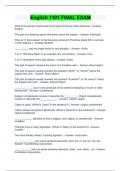English 1101 FINAL EXAM
What is the group of words that is the topic and focus of the sentence? - Answer-
Subject.
This part of a sentence gives information about the subject. - Answer- Predicate.
What is "in their waters" in the following sentence? (Piranhas attack fish or animals
in their wateres.) - Answer- Modifier.
__________ may be single words or verb phrases. - Answer- Verbs.
T or F: "Will have bitten" is an example of a verb phrase. - Answer- True.
T or F: Intransitive verbs take objects. - Answer- False
This part of speech receives the action of a transitive verb. - Answer- Direct object.
This part of speech usually answers the question "what?" or "whom?" about the
subject and verb. - Answer- Direct object.
This part of speech usually answers the question "to whom?" or "for whom?" about
the Subject and Verb. - Answer- Indirect object.
_____________ occur in the predicate of the sentence following a "to be" or other
linking verb. - Answer- Comlements.
Subject complements rename or describe the __________. Object complements
rename or describe the ____________. - Answer- subject; object
Carlos is upset. (What is "upset" in the sentence?) - Answer- subject complement
Carlos named one piranha Bucktooth. (What is "piranha" in the sentence?) - Answer-
object complement
_____________ describe or limit a subject, verb, object, or complement. - Answer-
modifiers
Piranhas have a nasty disposition. (What is "nasty" in the sentence?) - Answer-
modifier
This word literally means "a joining together." - Answer- conjunction
_______________ join equal sentence elements. (and, but, or, yet, for, nor, so) -
Answer- Coordinating conjunctions
____________ also join equal sentence elements. (both...and, either....or) - Answer-
Correlative conjunctions
, ______________ begin many dependent clauses. (because, since, although, if, until,
while, and others) - Answer- Subordinating conjunctions
_______ nouns name specific people, places, or things. - Answer- Proper
__________ nouns are all nouns that aren't proper. - Answer- Common
________ nouns name things that can be sensed. (example: table, waves, coat) -
Answer- Concrete
__________ nouns are things not knowable by the senses. (Example: justice, pity,
freedom) - Answer- Abstract
This type of noun names groups. (ex: family, committee, team) - Answer- collective
_______ nouns are several words joined by hyphens to form a noun. (brother-in-law,
commander-in-chief) - Answer- Compound
This part of speech takes the place of a noun and must meet three requirements. -
Answer- pronoun
What are the three requirements that pronouns must meet? - Answer- reference,
agreement, and case
_______ pronouns should be the subject or the complement in a sentence. -
Answer- Subjective
____________ pronouns should act as objects in a sentence. - Answer- Objective
Evelyn gave me the flu. (What is "me" in the sentence?) - Answer- Indirect object
_____________ pronouns show possession. - Answer- Possessive
_______________ pronouns refer to people or things. (he, she, him, his, it,they,
them, mine, I) - Answer- Personal
______________ pronouns introduce clauses. (who, whom, which, what, whose,
whoever) - Answer- Relative
Which cat is the mother? (What type of pronoun was used in the sentence?) -
Answer- Relative
_____________ pronouns introduce a question. (who, whose, what, which, whom) -
Answer- Interrogative
_______________ and ______________ pronouns refer back to a pronoun or
antecedent or intensify the antecedent. (myself, yourself, himself, herself, ourselves)
- Answer- Reflexive; intensive




